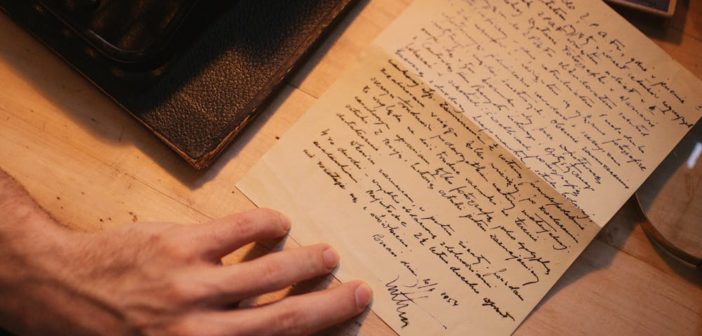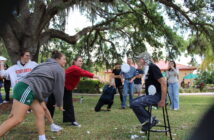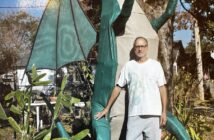By Mathew Rodgers, Staff Writer
On Monday, April 9, the U.S. Poet Laureate for 2011-2012, Philip Levine, visited Saint Leo University to give a poetry reading in the Greenfelder-Denlinger Boardrooms. This event was sponsored by the Department of English, Fine Arts, and the Humanities as well as the Cannon-Memorial Library and Student Services. Members of Sigma Tau Delta, the English honor society, acted as ushers and greeters.
The presentation opened with a musical performance by Pamela Hill Epps, saxophone, and Sam Koppelman, vibraphone, as the audience took their seats. After everyone was situated there was a quick video from www.cortlandreview.com which featured Levine as he talked about Brooklyn. Levine, being a poet, talked about Walt Whitman and the historical significance that Whitman has in Brooklyn. After the video, Levine was invited onto the stage and he began talking to the audience.
While on stage, Levine talked about the art of writing poetry and told stories as to what inspired him. Levine opened with a poem titled “The Poem of Chalk”, a poem that was inspired by a walk he took one day (walking being the cheapest form of entertainment), and then moved on from there to read other poems including “Our Reds”, which was in memory of the “Reds” that were in college with him (“Red” being the title given to all people with leftist political ideologies), and “Gospel”, a poem inspired by a trip he took to the Sierra Nevada mountain range. Levine also talked about the influence that jazz has had on him claiming that “one of the great riches has been music”. Earlier, in the video, he had spoken of how the album Going Home (by Archie Shepp and Horace Parlan) had been a huge inspiration to him and allowed him to create an undisturbed working environment, as his kids were often noisy while he was writing. While on the subject of music Levine read a poem entitled “Songs”, dedicating his reading to the musicians who performed earlier, and saying that the poem was inspired by Billie Holiday and a concert he attended of hers some time ago.
As far as poetry was concerned, Levine was modest about his multiple awards, invoking the idea that becoming a Pulitzer Prize winner or the Poet Laureate doesn’t make anyone a better poet than they were before receiving the award or honor. Although he did state that his mother used his Pulitzer prize to brag and that he could only imagine what she would say about him being the Poet Laureate if she were still alive, “My son is the Poet Laureate, what has your son done?” he stated in a joking manner. Levine did not think that there was a secret to being a successful poet and stated that “It’s all luck”. When questioned about what he was trying to accomplish through his poetry Levine stated “My aim is to write well” and then went on to explain how rational intelligence does not factor into his poetry as it “is subservient to my emotion”. One of the audience members asked Levine what he thought makes a good poem, “A good poet” he answered. Levine also stated that not every poem he writes is good, but rather “most poems are bad”, a rule, which in his opinion, does not only apply to his own poetry but poetry in general. He compared writing poetry to a batting average, and the idea that most of the time when a player swings the bat it is not a home run. Growing up during a time when anti-Semitism was rampant, Levine was also questioned by one of the audience members about his feelings toward Father Coughlin, who was an anti-Semite radio host during the 1930s, Levine obviously regarded Coughlin with disdain, expressing the fact that he did not miss the controversial radio broadcaster at all. After Levine finished reading poetry and answering questions there was a book signing in the Donald R. Tapia School of Business, where copies of his books were being sold in the lobby.
Tag Bio
Levine, who is now age 84 has won multiple awards including the Pulitzer Prize for his work The Simple Truth and the National Book Award for his collection What Work Is. Growing up in industrial Detroit, Levine was the son of Jewish immigrants Harry and Esther Levine and was one of three boys, including his identical twin brother. Levine started working in an auto plant at the age of 14 and graduated from Detroit Central High School in 1946. As a poet, he expresses the experience of the working class, as well as the experiences of Jewish immigrant families. Levine has authored 21 collections of poetry and published both essays, and translations of existing works. Levine has taught in the English Department of California State University and various other universities. Levine and his wife currently spend half the year in Brooklyn, N.Y., and the other half of the year in Fresno, Calif.





